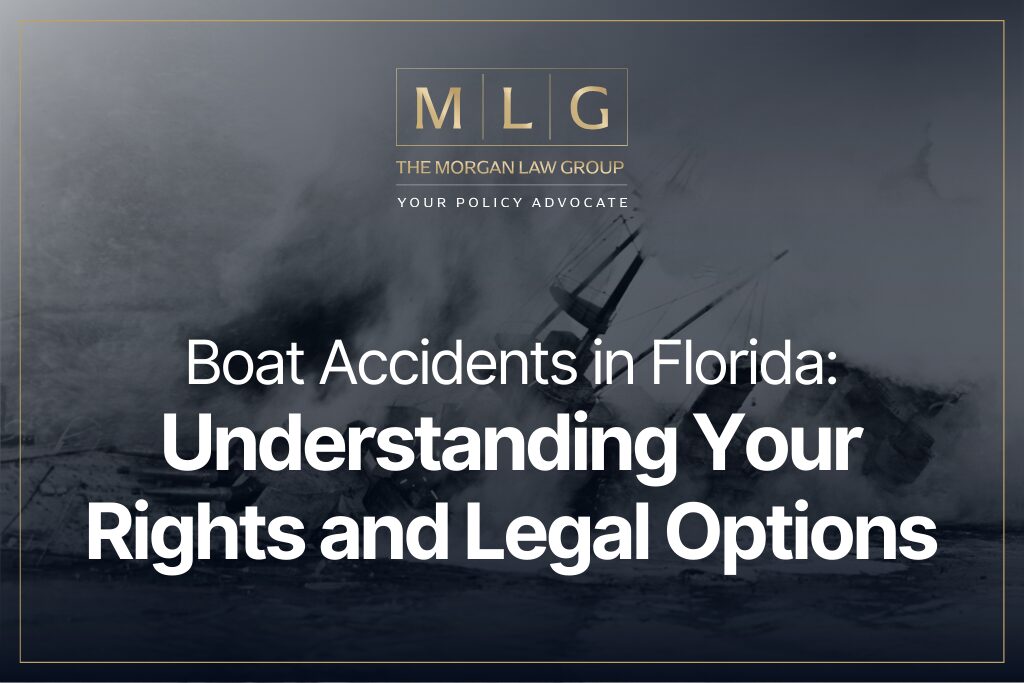Boat accidents in Florida are no joke. These aren’t just small boat versions of fender-benders; people have been severely hurt and even killed. And while insurance policies will cover much of the financial cost associated with boating accidents, sometimes some limits leave you in a financial bind. But you do have legal options and rights, and a great lawyer can help you deal with any legal issues that develop because of the accident.
Why Do Most Boat Accidents Occur?
Most boat accidents occur due to negligence, faulty equipment, weather, or a combination.
What to Do if You’re in a Boat Accident
Safety and health are immediate concerns after any boat accident, so get people back to safety first if there are severe injuries, if someone’s fallen overboard, or if the boat is no longer water-worthy.
Next, document everything you can about the accident. Get insurance and ID information from the other party involved if you can; take pictures of everything, especially if the other party refuses to cooperate. Be very careful about posting on social media after the accident as emotions can run high, and you may say something that could affect any insurance claims and lawsuits you file.
Florida law requires vessel operators who were in an accident to report the accident as quickly as possible to the local sheriff, police, or Florida Fish and Wildlife Conservation Commission office. Of course, if the accident is serious, you’re going to have to call the police/sheriff and paramedics, anyway.
How to Determine Who’s at Fault After a Boat Accident
While it’s possible that an accident could be unavoidable, most of the time, there’s at least one person at fault. It could be that another boat driver crashed into your boat because they were drunk, for example, and it’s easy to see who’s to blame there. But depending on the circumstances of the specific accident you were in, you could partially be to blame, the boat manufacturer could be to blame for defective parts, a boat repairperson could be to blame for faulty repairs, a guard could be to blame for letting a boater go into the wrong section near a beach where boats weren’t allowed, and so on.
Never jump to conclusions about who is finally responsible for your accident without speaking with a lawyer. You may think something was unavoidable, but the lawyer may realize it wasn’t.
Why Would Your Insurance Not Cover Something After a Boat Accident?
Insurance policies have limits on the financial amount they’ll cover. Most of the time, the problem is that the policy’s coverage limits are lower than the actual costs you incur. This can be devastating if you’ve been unable to work and are now saddled with hospital bills from your accident. However, sometimes insurance companies claim they won’t cover the accident at all because of questions about who’s at fault and whether what happened is something they’ve agreed to cover in the policy. Finally, sometimes what happened isn’t covered. The policy you’re dealing with may not include emotional suffering, for example.
This is why many people end up suing for personal injury even when they and everyone else involved have insurance. However, you must speak with an attorney who’s well-versed in personal injury and boating laws before taking any steps toward a court case.
A lawyer can find precedents set by previous cases that help you, and they can let you know if something you thought was unimportant was crucial to winning your case. It’s not always obvious to non-lawyers just how many avenues there may be to prove that someone was responsible for your injuries and should pay. The lawyer can also help you track down evidence that you may not have been able to find so far.
How You Can Help Prevent Boat Accidents
Ensuring your boat is in good operating condition and paying attention to what’s around you helps prevent many accidents, and there are a few other things you can do. Even if you’ve been on boats your entire life, please look into taking boating classes if you haven’t already, to ensure you know about the latest laws and issues affecting boaters.
Do not drink at all if you’re driving a boat; no matter how well you handle your alcohol or how little you have to drink, if you’re in an accident and have any alcohol in your system, that will complicate your case if you sue for compensation after an accident you didn’t cause. That’s because the defense will do what it can to pin at least part of the blame on your potentially being impaired.
Florida also has a Boating Under the Influence law, and your blood alcohol level does not have to be above a certain point to violate the law. Police can arrest you for a BUI if you appear to be impaired, so this can be rather subjective. Don’t take a chance.
Also, don’t let your ego control what you do. In a report on boating accidents, the Florida Fish and Wildlife Conservation Commission tells of two boats that collided when their operators refused to steer away as they headed right for each other. They both finally tried to move out of the way, but unfortunately, both turned in the same direction and hit each other. Moving out of the way early could have prevented that, so don’t become determined to be the one that others have to move around.
If you or a loved one has been involved in a boat accident, contact the Morgan Law Group for help. Whether you have medical bills or property damage that exceed insurance policy limits, or you’ve suffered psychologically due to the accident, you should get the compensation you need, not what a policy demands you get. Seek legal help for the best outcome possible.

